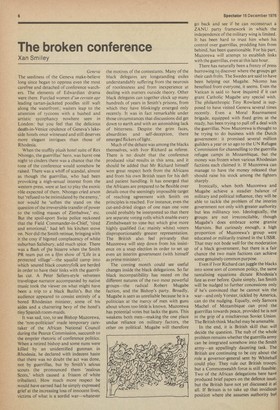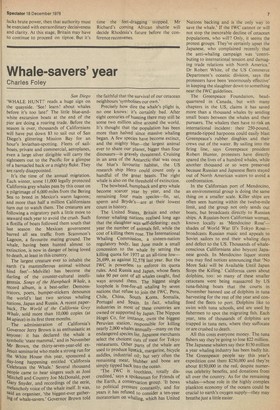The broken conference
Xan Smiley
Geneva The seediness of the Geneva make-believe long since began to oppress even the most carefree and detached of conference watchers. The elements of Edwardian drama were there. Furclad women d'un certain age leading tartan-jacketed poodles still waft along the waterfront; waiters leap to the attention of tycoons with a hushed and artistic sycophancy nowhere seen in London: but you feel that the delicious death-in-Venice opulence of Geneva's lakeside hotels once witnessed and still deserves more elegant intrigues than those of Rhodesia.
When the stuffily plush hotel suite of Rex Nhongo, the guerrillas' hero, was burnt one night to cinders there was a chance that the tone of the conference would somehow be raised. There was a whiff of scandal, almost as though the guerrillas, who had been provoking a nigh-sexual interest from the western press, were at last to play the exotic role expected of them. Nhongo cried arson but 'refused to be intimidated by the enemy,' nor would he 'soften the stand on the question of the irreversible transfer of power to the toiling masses of Zimbabwe,' etc. But the spoil-sport Swiss police reckoned that the Field Commander-in-Chief, 'tired and emotional,' had left his kitchen stove on. Nor did the Smith retinue, bringing with it the cosy if bigoted complacency of white suburban Salisbury, add much spice. There was a flash of the bizarre when the Smith PR team put on a film show of 'Life in a protected village'—the squalid camp into which soured black countryfolk are herded in order to have their links with the guerrillas cut. A Peter Sellers-style velveteen travelogue narrator accompanied by native music took the viewer on what might have been a trip to a black Butlin's. But the audience appeared to consist entirely of a bored Rhodesian minister, some of his aides and a chattering bevy of the hotel's tiny Spanish room-maids.
It was sad, too, to see Bishop Muzorewa, the 'non-politician' made temporary caretaker of the African National Council during the Pearce Commission, succumb to the emptier rhetoric of conference politics. When a retired bishop and some nuns were killed by an unidentified gunman in Rhodesia, he declared with indecent haste that there was no doubt the act was done, not by guerrillas, but by Smith's selous scouts (he pronounced them 'zealous Scots,' which caused a frisson of white tribalism). How much more respect he would have earned had he simply expressed grief at the increasing loss of innocent lives, victims of what is a sordid war—whatever
the motives of the contestants. Many of the black delegates are longstanding exiles understandably suffering from the neurosis of rootlessness and from inexperience at dealing with matters outside theory. Other black delegates can together clock up many hundreds of years in Smith's prisons, from which they have blinkingly emerged only recently. It was in fact remarkable under those circumstances that discussions did get down to earth and with an astonishing lack of bitterness. Despite the grim faces, absurdities and self-deception, there emerged flickers of light.
Much of the debate was among the blacks themselves, with Ivor Richard as referee. There is no doubt that the conference produced vital results in this area, and it should be added that Mr Richard himself won great respect both from the Africans and from his own British team for his deft and patient handling. It has emerged that the Africans are prepared to be flexible over details once the seemingly impossible target of reaching agreement with Smith on principles is reached. For instance, even the cut-and-dried slogan of one man one vote could probably be interpreted so that there are separate voting rolls which enable every Zimbabwean to vpte but which give more highly qualified (i.e. mainly white) voters disproportionately greater representation. The British also feel privately that Muzorewa will step down from his insistence on a snap election in order to set up even an interim government (with himself as prime minister).
The coming month could see useful changes inside the black delegations. So far black incompatibility has rested on the different natures of the two most powerful groups—the radical Robert Mugabe faction, and the Bishop's party. Broadly, Mugabe is seen as unreliable because he is a politician at the mercy of men with guns about whom too little is known. Muzorewa has potential votes but lacks the guns. This weakens both men—making the one place undue reliance on military factors, the other on political. Mugabe will therefore
go back and see if he can reconstruct a ZANU party framework in which the independence of the military wing is limited. It has been hard to trust him when his control over guerrillas, prodding him from behind, has been questionable. For his part, Muzorewa will attempt to establish links with the guerrillas, even at this late hour.
There has naturally been a frenzy of press burrowing to discover where the groups get their cash from. The Swedes are said to have been helping out Mugabe. Nkomo has benefited from everyone, it seems. Even the Vatican is said to have inquired if it can grant Catholic Mugabe any special wish. The philanthropic Tiny Rowland is supposed to have visited Geneva several times recently. Even a Moral Rearmament brigade, equipped with fixed grins at the ready, has been trying to pull off a deal with the guerrillas. Now Muzorewa is thought to be trying to do business with the Dutch government: it promised several million guilders a year or so ago to the UN Refugee Commission for channelling to the guerrilla refugee camps in Mozambique, but the money was frozen when various Rhodesian factions each claimed it. If Muzorewa can manage to have the money released that should raise his stock among the fighters sharply.
Ironically, when both Muzorewa and Mugabe achieve a steadier balance of military and political influence, they will be able to tackle the problem of the interim government not only with greater authority but less militancy too. Ideologically, the groups are not irreconcilable, though Mugabe's does embrace some granite Marxists. But curiously enough, a high proportion of Muzorewa's group were educated or militarily trained in the USSR. That may not bode well for the moderation of a black government, but there is a fair chance the two main factions can achieve some genuinely common purpose.
Even if Ivor Richard can juggle the blacks into some sort of common policy, the same tantalising equations dictate Rhodesia's fate as ever before. Quite simply, Ian Smith will be nudged to further concessions only if he's convinced that he cannot win the war—and only Vorster, tickled by America, can do the nudging. Equally, only Samora Machel of Mozambique can prod the guerrillas towards peace, provided he is not in the grip of a mischievous Soviet Union. The British think Machel may be amenable.
In the end, it is British skill that will decide the question. The nub of the whole problem remains whether the guerrilla army can be integrated somehow into the Smith army—an appallingly daunting task. The British are continuing to be coy about the role a governor-general sent by Whitehall r could play. They rule out British troops, but a Commonwealth force is still feasible. Two of the African delegations here have produced brief papers on the defence issue, but the British have not yet discussed it at all. If Britain is to take up that invidious position where she assumes authority but
lacks brute power, then that authority must be exercised with extraordinary decisiveness and clarity. At this stage, Britain may have to continue to proceed on tiptoe. But it's time the feet-dragging stopped. Mr Richard's coming African shuttle will decide Rhodesia's future before the conference reconvenes.















































 Previous page
Previous page